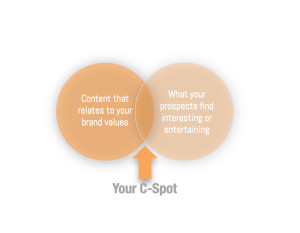Content marketing is hot. Sure it’s been around in one form or another since Michelin published its first Guide in 1900, but in 2013 it has a new lease on life as marketers realize that it can provide the fuel to drive customer engagement in social media and – perhaps – actually sell stuff.
As is usually the case with any business trend, content marketing has bred its own vernacular as experts try to over-intellectualize it, bandying about terms like “customer engagement” (see previous paragraph), “listicle”(gag), “brand newsroom” and “content engineer”.
That last term is an earnest attempt at merging the crafts of journalism and copywriting to describe the skill set required for successful content marketing. There’s an inherit truth to it: that neither journalism nor copywriting is exactly right for content marketing. As both an ad agency guy and online magazine publisher, I have seen the gulf separating copywriting and journalism first-hand.
The essential challenge facing content marketers is finding the elusive “C-Spot” (you read it here first), the place where content relevant to your brand intersects with content that informs and entertains. And gets lots of page views.

Your C-Spot ensures your content marketing gets noticed.
Why is it so hard to find the C-Spot? There are many reasons why so much branded content reaches so few people and fails to build brands. Today, I’d like to focus on one reason: the people who are often engaged to develop the content – ad agency copywriters on the one hand, journalists on the other – aren’t right for the job.
Let’s start with copywriters. Weaned on years of developing single-minded BIG IDEAS that tout a brand’s promise, copywriters struggle with content marketing.
First, they tend to see content as a sprint and not the never-ending marathon that it is.
Second, they’ve been trained (correctly) to write copy that sells the client’s product. Their natural inclination is to skip the foreplay, and just get it on. But sell-copy in content marketing is almost certainly going to turn off your prospect – it’s de facto advertorial, and really, who wants to read advertorials?
Third (and it pains me to say this), many copywriters simply can’t write long-form copy. (Ask your current agency copywriter to show you their book of long-form writing.) That’s not a criticism of their marketing skills…it’s just that they have different ones than those required for developing content that’s more than 50 or 100 words.
Now let’s turn to trained journalists. Can they write your content?
First, there’s the very real issue of squeamishness. Journalists are trained to be objective, and (in an ideal world) uncover the facts as members of the fourth estate. They see working a brand’s message into content as a subversion of journalism, if not downright unethical. Combine that with an education that teaches them to be sceptical of corporate interests, and you’ve got someone who has to hold his nose every time they pick up his keyboard to write for you.
Second, journalists are not trained to think about how their copy ultimately guides the reader to making a purchase. Again, this is not a criticism of their writing skills…it’s just that they have different ones than those required for content marketing.
So who, then, should write your content? I think there’s a new kind of writer emerging for that job, called the “brand entertainer”. Yes, it’s another “buzz-phrase”. In my next post, I’ll discuss what makes a great brand entertainer.
Peter Coish is the founder of KURATION. He can be reached by email here.

